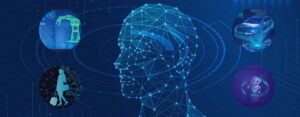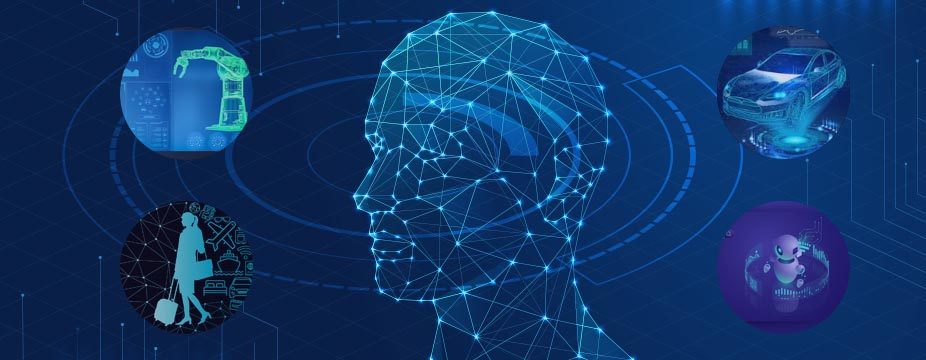 “Deep learning is the key to unlocking the full potential of artificial intelligence and ushering in the era of truly intelligent machines.” – Ian Goodfellow, Director of Machine Learning at Apple.
“Deep learning is the key to unlocking the full potential of artificial intelligence and ushering in the era of truly intelligent machines.” – Ian Goodfellow, Director of Machine Learning at Apple.
Deep Learning, as we learned about in the previous blog, is a powerful subset of artificial intelligence, that has revolutionized various industries with its ability to learn from data and make intelligent decisions. From image recognition to speech synthesis, Deep Learning has found applications in diverse domains.
In this blog, we will explore some of the real-life applications of Deep Learning, showcasing its transformative impact on industries worldwide.
Computer Vision
One of the real-life applications is Computer Vision, enabling machines to see and understand visual data like never before. In fields such as autonomous vehicles, surveillance, and healthcare imaging, Deep Learning algorithms excel in tasks such as object detection, image classification, and semantic segmentation.
For example, self-driving cars use Deep Learning to identify objects, pedestrians, and traffic signs in real time, ensuring safety on the roads. Medical imaging benefits from Deep Learning by accurately detecting diseases and abnormalities in X-rays, MRI scans, and pathology images, aiding in early diagnosis and treatment planning.
Natural Language Processing
Computers, as you well know have their own language, consisting of 1’s and 0’s. Deep Learning has helped transform the field of natural language processing (NLP), enabling machines to understand and generate human language. Chatbots and virtual assistants leverage Deep Learning techniques for conversational interfaces, providing personalized customer support and information retrieval. Sentiment analysis, language translation, and speech recognition are other applications where Deep Learning algorithms have made significant advancements.
For instance, voice assistants like Siri and Alexa employ Deep Learning models to understand and respond to user commands, making our interactions with technology more intuitive and seamless.
Recommender Systems
For years, companies have transformed the way we lived with continuous advertisements and messages. Imagine what they could achieve if they made this personalized to the needs of every person. We know this technology already exists but what has Deep Learning got to do with it?
Recommender systems, which provide personalized recommendations to users, heavily rely on Deep Learning techniques. By analyzing user preferences and historical data, Deep Learning algorithms can accurately predict and suggest relevant products, movies, or music. This enhances the user experience and drives customer engagement and satisfaction.
Platforms like Netflix and Spotify leverage Deep Learning-based recommendation engines to provide tailored content recommendations, keeping users hooked and improving user retention.
Healthcare
Deep Learning has immense potential in the healthcare industry, revolutionizing disease diagnosis, drug discovery, and personalized medicine. Deep Learning algorithms can analyze medical images, such as CT scans and mammograms, to detect anomalies and assist radiologists in making accurate diagnoses.
In drug discovery, Deep Learning models can predict the efficacy and safety of potential drug candidates, expediting the development process. Moreover, Deep Learning enables precision medicine by leveraging patient data to predict disease progression, identify genetic risks, and personalize treatment plans, leading to better healthcare outcomes. This can make the world live longer and better lifestyles.
Financial Services
Deep Learning has found numerous applications in the financial services sector. Fraud detection and prevention benefit from Deep Learning algorithms that can identify suspicious patterns in transactions and flag fraudulent activities in real time, protecting customers’ financial assets. Deep Learning models also excel in credit risk assessment, utilizing vast amounts of data to make accurate predictions on loan approvals and credit worthiness.
Moreover, algorithmic trading leverages Deep Learning to analyze market data and make informed investment decisions, enhancing trading strategies and optimizing investment portfolios.
Conclusion
Deep Learning is transforming industries across the globe, empowering machines to analyze data, understand complex patterns, and make intelligent decisions. From computer vision and natural language processing to healthcare and finance, the real-life applications of Deep Learning continue to reshape industries, bringing about innovative solutions and driving progress in the age of artificial intelligence.
Stay tuned to Rucha Yantra’s Knowledge Corner as we go deeper into the world of Deep Learning in the upcoming blogs. Next, we will try and see the impact of Deep Learning on manufacturing.



